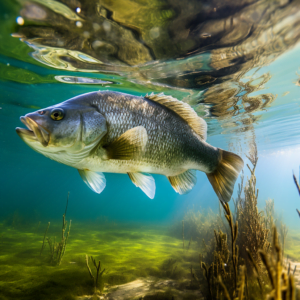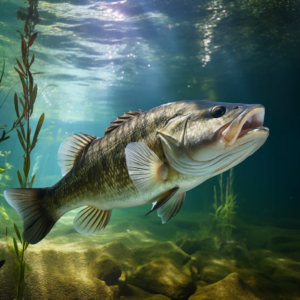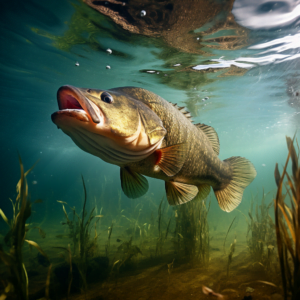So, have you ever wondered how smart a largemouth bass is? I mean, they’re fish, right? How intelligent can they really be? Well, you might be surprised to learn that these fish actually have quite a bit going on upstairs. In fact, researchers have found that largemouth bass possess a range of cognitive abilities that are really quite fascinating.
When it comes to intelligence, largemouth bass are not your typical fish. They have been shown to have excellent problem-solving skills, and can even learn from their experiences. For example, they have been observed figuring out how to navigate through mazes and finding hidden food sources. This ability to learn and adapt to their environment is a sign of their intelligence.
But it doesn’t end there. Largemouth bass also have an impressive memory. They can remember complex spatial information, such as the location of specific objects or hiding spots, for extended periods of time. This is especially useful for them when it comes to hunting and finding food. It’s like they have their own built-in GPS!
In addition to their problem-solving skills and memory, largemouth bass also exhibit social behaviors that suggest a level of intelligence. They have been observed engaging in cooperative hunting, where they work together to corner and trap their prey. This kind of teamwork requires communication and coordination, which shows that these fish are capable of complex social interactions. So, if you think fish are just brainless swimmers, think again. There’s more going on in the mind of a largemouth bass than meets the eye.
The Intelligence of Largemouth Bass
When it comes to intelligence in the animal kingdom, we often think of mammals like dolphins or primates. However, there are many examples of intelligence in the underwater world as well. One fascinating fish species that showcases remarkable intelligence is the largemouth bass. Despite being a species of fish, largemouth bass exhibit a surprising level of intelligence in various aspects of their lives. In this article, we will delve into the intelligence of largemouth bass, exploring their physical characteristics, hunting techniques, problem-solving abilities, adaptability to the environment, communication and social behavior, learning and memory, tool usage and manipulation skills, and how their intelligence compares to other fish species. We will also consider the role of brain size in largemouth bass intelligence and discuss the implications and future research in understanding their intelligence.
Physical Characteristics of Largemouth Bass
To understand the intelligence of largemouth bass, it is important to first explore their physical characteristics. Largemouth bass, scientifically known as Micropterus salmoides, are a species of freshwater fish commonly found in North America. They are well-known for their distinct appearance, specifically their large mouths that give them their name.
Largemouth bass have an average length of 18 inches and can weigh up to 10 pounds. They have a sleek body shape, with a dark green color on their back and sides, fading to a lighter shade on their bellies. Their bodies are covered in small scales, offering protection from potential predators.
Hunting Techniques of Largemouth Bass
Largemouth bass are voracious predators and have developed unique hunting techniques to catch their prey. They are skilled ambush predators, often lurking among aquatic vegetation or near underwater structures such as fallen trees or submerged rocks. This enables them to surprise their prey with lightning-quick strikes.
Their hunting strategy involves a combination of patience, stealth, and precise movements. Largemouth bass rely on their excellent sense of vision and lateral line system, which allows them to detect vibrations in the water. They patiently wait for their prey to approach, then swiftly strike, engulfing the prey whole with their large mouths.
Problem-Solving Abilities in Largemouth Bass
One aspect of intelligence in largemouth bass is their problem-solving abilities. Researchers have conducted studies to investigate their cognitive skills, and the results have been quite intriguing. For example, in one study, largemouth bass were trained to associate a colored shape with a reward, such as food. The fish quickly learned to recognize and remember the association, demonstrating an ability to solve problems through associative learning.
These studies indicate that largemouth bass possess a certain degree of cognitive flexibility, allowing them to adapt and solve problems based on previous experiences. This implies that they have a capacity for learning and memory retention, which plays a vital role in their survival and success as predators in their environment.
Ability of Largemouth Bass to Adapt to Environment
Adaptability is another remarkable aspect of largemouth bass intelligence. They have the ability to adapt to different environmental conditions, providing them with a significant advantage in their habitats. Largemouth bass are known for their ability to tolerate varying water temperatures, oxygen levels, and even salinity.
Their adaptability extends to their feeding habits as well. Depending on the availability of prey, largemouth bass can adjust their diet accordingly. This flexibility in feeding behavior allows them to survive in different environments and maintain their population even when conditions are challenging.
Communication and Social Behavior of Largemouth Bass
Largemouth bass also exhibit interesting communication and social behavior, indicating a level of intelligence in their interactions with other individuals. They use a combination of visual displays, vibrations, and chemical signals to communicate with conspecifics. For example, males create circular nests in shallow water and use tail vibrations to attract females during the breeding season.
Furthermore, largemouth bass exhibit social hierarchies, with dominant individuals occupying the best hunting and spawning territories. This social structure suggests an understanding of the benefits of cooperation and competition, further highlighting their intelligence in navigating social dynamics within their population.
Learning and Memory in Largemouth Bass
The learning and memory abilities of largemouth bass are an essential aspect of their intelligence. Research has shown that largemouth bass possess an impressive ability to learn and retain information. They can remember the location of prey-rich areas, recognize individual prey, and even remember previous encounters with predators.
Studies have also revealed that largemouth bass can be trained to recognize landmarks and memorize spatial information. This ability to navigate their environments based on memory plays a crucial role in their foraging and hunting success, reflecting their intelligence and adaptability.
Tool Usage and Manipulation Skills in Largemouth Bass
While tool usage is often associated with higher-order mammals, there is evidence to suggest that largemouth bass possess rudimentary tool usage and manipulation skills. In certain instances, they have been observed using their mouths to manipulate objects, such as rocks or vegetation, to create hiding spots or disturb potential prey.
These instances of tool usage indicate a level of problem-solving and adaptability in largemouth bass. While their manipulation skills may not be as sophisticated as those found in primates, they demonstrate an ability to use their environment to their advantage, highlighting their intelligence in resource utilization.
Intelligence Compared to Other Fish Species
When comparing the intelligence of largemouth bass to other fish species, it is evident that they possess a higher level of cognition and problem-solving abilities. While exact rankings of fish intelligence are challenging to establish, research suggests that largemouth bass are among the most intelligent of fish species.
Their ability to learn, memorize, problem-solve, and adapt places them above many other fish species in terms of intelligence. However, it is important to acknowledge that intelligence is a complex trait that can vary within species and individuals, making it difficult to draw definitive conclusions about the comparative intelligence of different fish.
The Role of Brain Size in Largemouth Bass Intelligence
Among the factors that contribute to largemouth bass intelligence, brain size plays a significant role. Largemouth bass possess relatively large brains compared to their body size, suggesting a correlation between brain size and cognitive abilities.
The larger brain size allows for increased processing power and the development of complex neural networks. This enables largemouth bass to exhibit higher levels of intelligence, including problem-solving, memory retention, and adaptability.
Implications and Future Research in Understanding Largemouth Bass Intelligence
Understanding the intelligence of largemouth bass is not merely a matter of curiosity. It has important implications in various fields, such as fisheries management and conservation. By studying their cognitive abilities, scientists can gain insights into their behavior, ecology, and response to environmental changes.
Future research should further explore the intricacies of largemouth bass intelligence, including their perception, social behavior, and problem-solving capabilities. By unlocking the mysteries of their intelligence, we can enhance our understanding of not only largemouth bass but also other fish species and the remarkable cognitive abilities that exist beneath the surface of our aquatic ecosystems.
To wrap up, largemouth bass prove that intelligence is not exclusive to mammals and birds. These fascinating fish demonstrate cognitive flexibility, problem-solving skills, adaptability, communication, and memory retention, all of which contribute to their overall intelligence. Their ability to navigate their environment, manipulate objects, and learn from past experiences showcases their remarkable capabilities. Studying the intelligence of largemouth bass not only sheds light on the cognitive abilities of fish but also highlights the fascinating intricacies of our underwater world.




